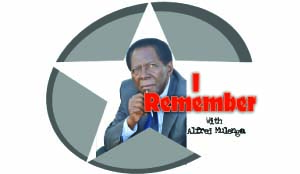 WHEN Zambia became an independent sovereign state, Government set up various agencies and institutions to fight vices that threatened the economic and political development of the new nation like crime, corruption and exploitation of man by man.
WHEN Zambia became an independent sovereign state, Government set up various agencies and institutions to fight vices that threatened the economic and political development of the new nation like crime, corruption and exploitation of man by man.
However, these agencies, including the Anti-Corruption Commission (ACC), Anti-poaching Wing of the Zambia Police Service and the Judiciary were often accused of targeting the ordinary Zambian while sparing the ‘big fish’ in the corridors of power in Lusaka, the capital, and other provincial centres.
Accusations of favoritism, nepotism, regionalism and tribalism became the order of the day as the fight for a fair share of the small national cake intensified, notably immediately after Zambia was declared a one-party state.
But the arrest and subsequent imprisonment of a Cabinet minister, which was unprecedented, showed that some of the accusations levelled at the government and its agencies were totally unfounded.
I remember the arrest of former Copperbelt provincial minister Dingiswayo Banda, one of the independence heroes and orator, sent shockwaves.
His imprisonment on ‘a poaching’ charge and conviction in 1979 prompted a Cabinet reshuffle by President Kaunda, who had suspended him as minister of Labour and Social Services and Chief Whip in the National Assembly.
News had filtered through that Banda and two others had been stopped and sensationally nabbed at a roadblock mounted by Zambia Police and Department of Wildlife and National Parks operatives for being found with elephant meat without a hunting licence in contravention of the Wildlife Conservation Act.
Banda was later tried and convicted in open court by a Lusaka magistrate’s court.
He appealed his conviction and sentence but his appeal was dismissed by the High Court on March 27, 1980, and his sentence increased to 12 months’ imprisonment with hard labour – with another nine-month prison sentence to run concurrently.
It was unbelievable – simply unbelievable especially that this happened at a time when political apologies had become seemingly fashionable as former liberation comrades got embroiled in a ‘swim-or-sink’ battle for survival.
It was also at a time when some magistrates and High Court judges were being accused of miscarriage of justice in the way they handled cases involving ordinary citizens against the ruling elite.
In the minor Cabinet reshuffle announced on December 24, 1979, Mr Joshua Lumina, who had been Minister of Finance and Technical Cooperation, was named Labour and social services minister, replacing suspended Banda.
Mr Kebby Musokotwane, who later became Prime Minister, was appointed Finance minister while former University of Zambia (UNZA) lecturer Ben Kakoma took over from Musokotwane as minister of Youth and Sports.
Although his political career took a nosedive following his imprisonment, Banda’s popularity, as a tough- talking negotiator remained intact.
He was well liked despite his sudden fall from grace. Most people, in fact, believed that he was just unlucky to have been caught because there were allegations of a lot more senior government officials engaged in corruption, illegal game hunting and other malpractices who got away scot-free or received lighter sentences.
However, upon his imprisonment, a new word ‘Dingi’ became popular among Zambians as they used it when referring to meat other beef.
Butchery owners would even tell their customers of fresh supplies of ‘Dingi’ (legally obtained or otherwise) so they could buy some and spice up meals for their families.
The ‘Dingi’ stigma did little to blur the fact that Banda was an outstanding politician who played a key role in improving government-trade union relations, which had become strained as miners on the volatile Copperbelt pressed for improved pay and other conditions of employment.
In later years he seems to have also worked well with the Zambia Congress of Trade Unions (ZCTU) under the leadership of its chairperson-general, Frederick Chiluba.
So it came as no surprise that when his Movement for Multiparty Democracy (MMD) defeated the then ruling United National Independence Party (UNIP) in the 1991 multiparty elections (that marked the end of one-party regimentation in the country), President Chiluba sought to ‘rehabilitate’ Dingiswayo Banda by appointing him as Zambia’s High Commissioner to Zimbabwe.
During the struggle for independence Banda was part of the group of nationalist leaders that included Mr Fines Bulawayo, Joseph Mutale, Andrew Mutemba, Solomon ‘Son of the soil’ Kalulu, Peter Chanda, Munukayumbwa Sipalo and Lewis Changufu who moved crowds whenever they toured the country holding political rallies.
When called to the podium to address the people, Dingiswayo Banda was always on fire, lambasting the colonialists for their racial policies. His oratory skills were second to none; he was a role model in his own right. I remember one incident in Mufulira when, as labour minister, he was given a standing ovation by miners whom he had persuaded to call off their wildcat strike than had threatened to paralyze copper production on the Copperbelt.
In the field of sport and football in particular, Banda as Sports minister can be said to have been the key player in ending the bickering between the defunct National Football League (NFL) and Football Association of Zambia (FAZ) and the formation of a one soccer body in the country under veteran administrator and Ndola magnate, Tom Mtine.
Banda’s imprisonment may have tarnished his colourful political career but it showed that under the law there are no sacred cows, which is what it should be in any democratic dispensation.
Comments:
alfredmuleng777@gmail.com






